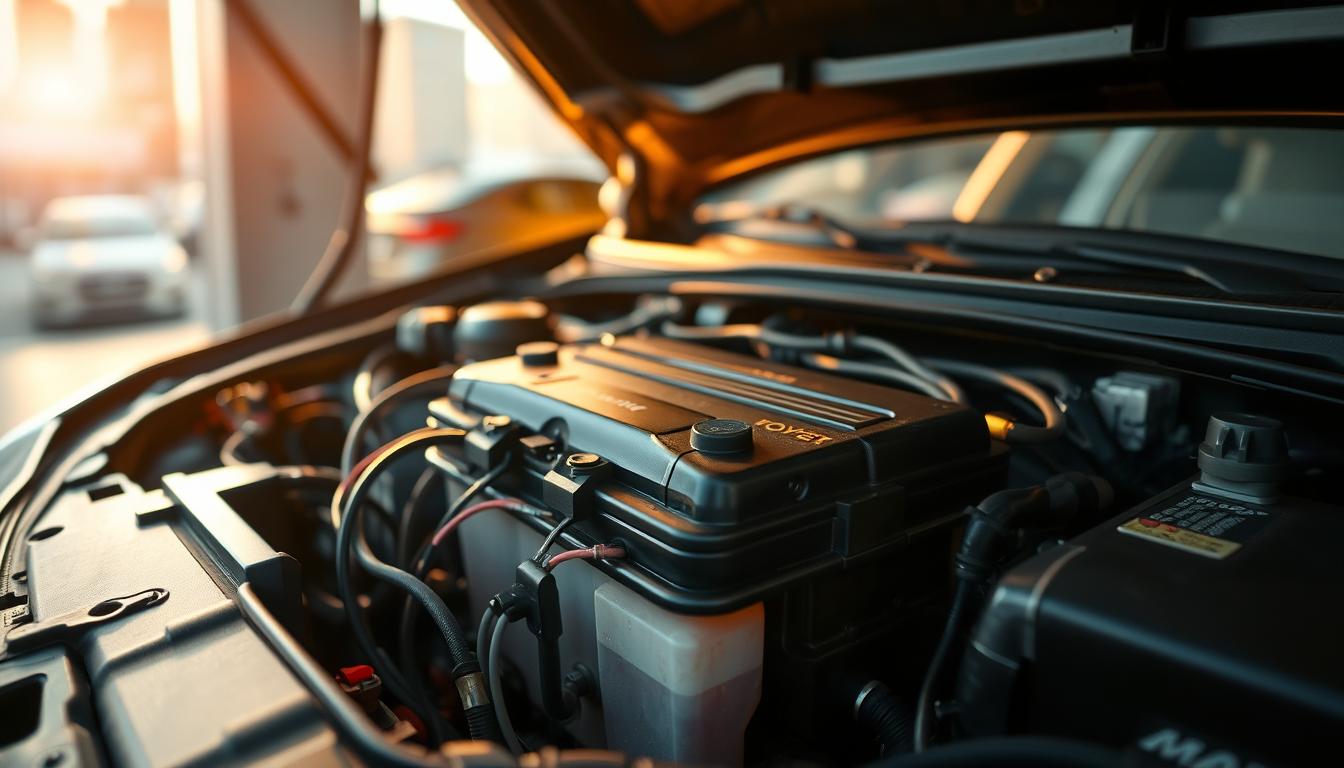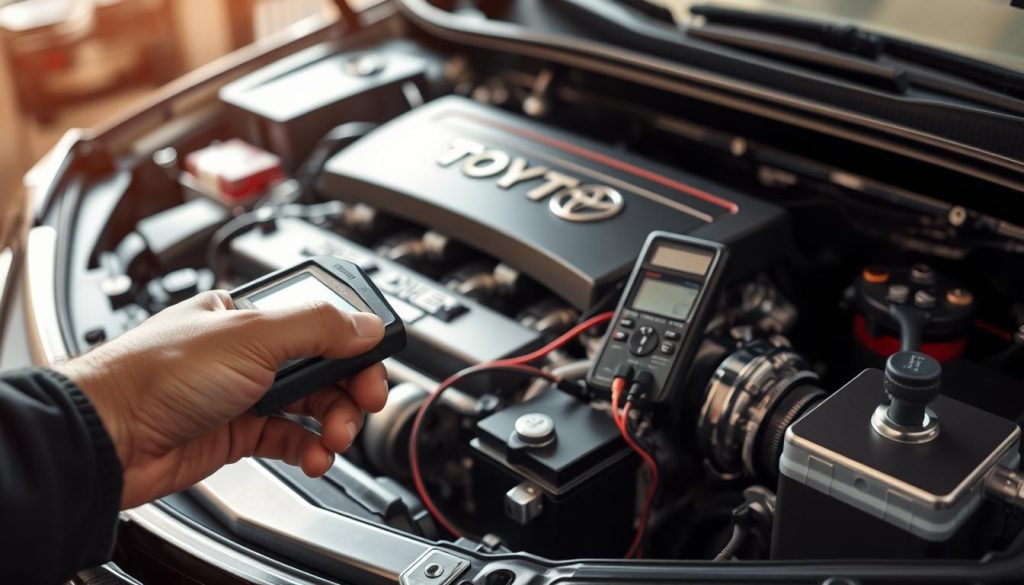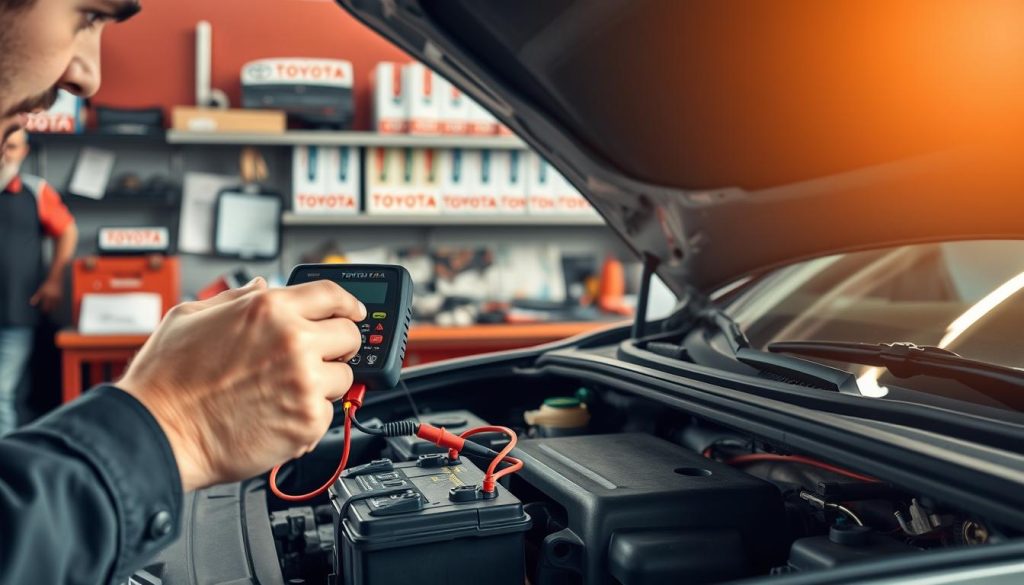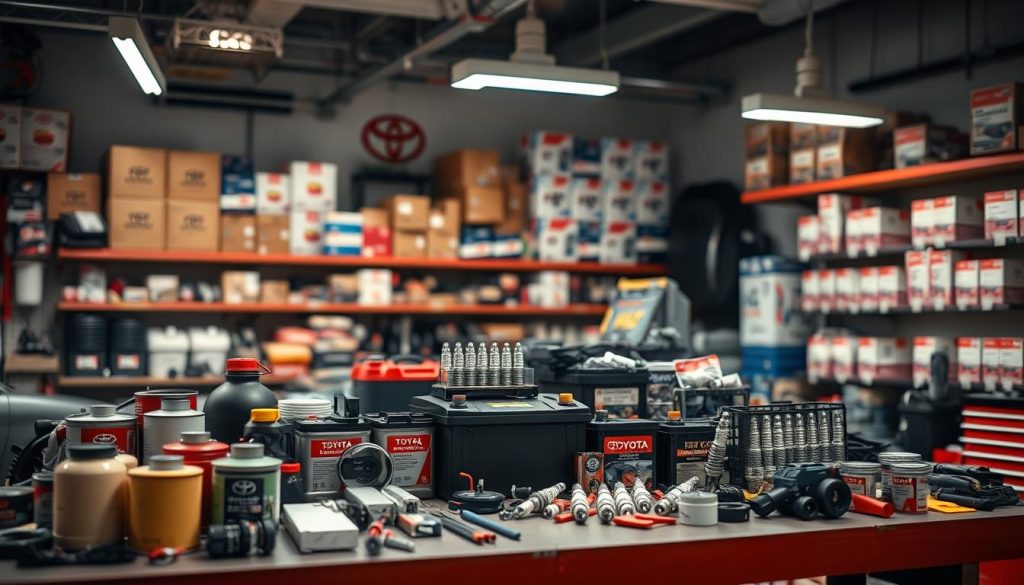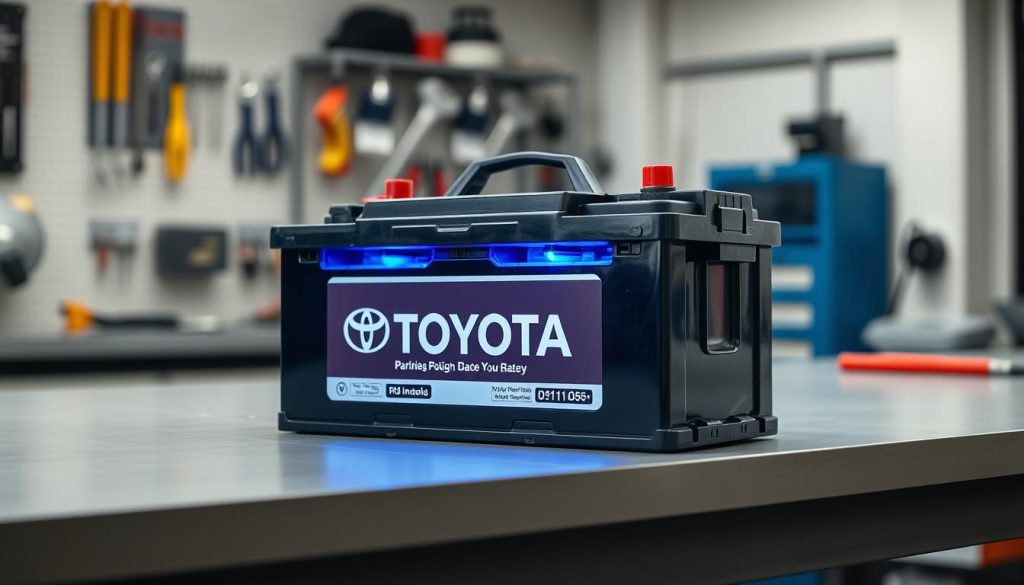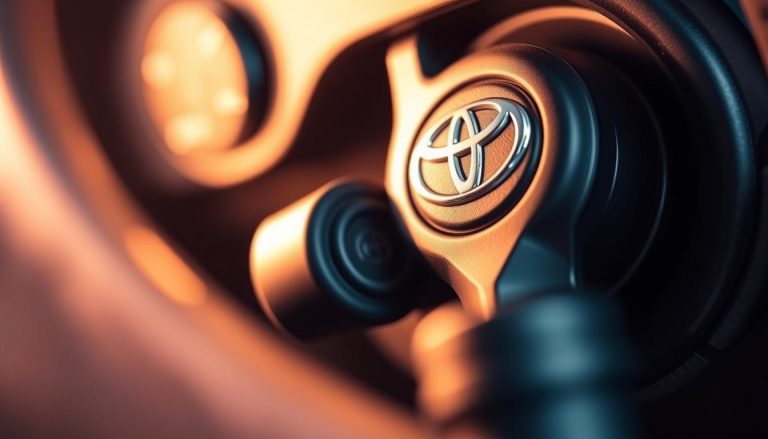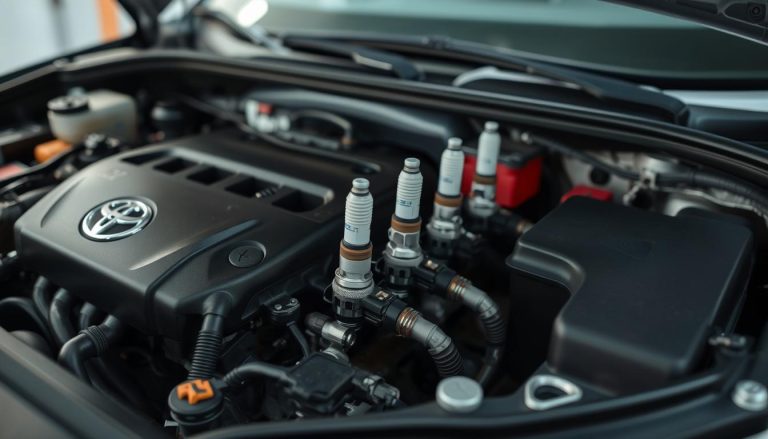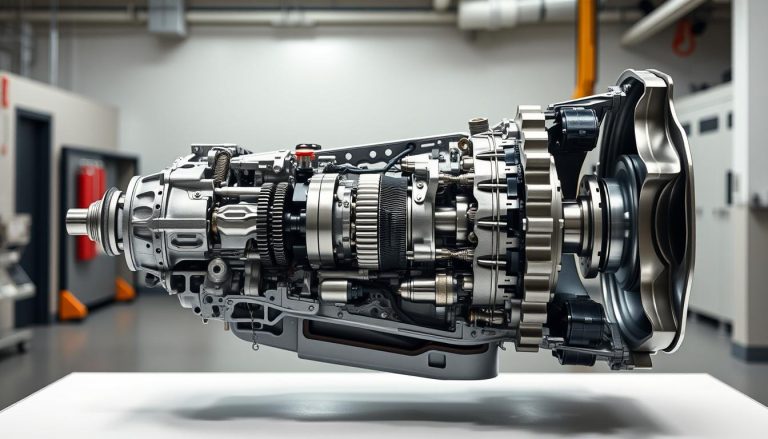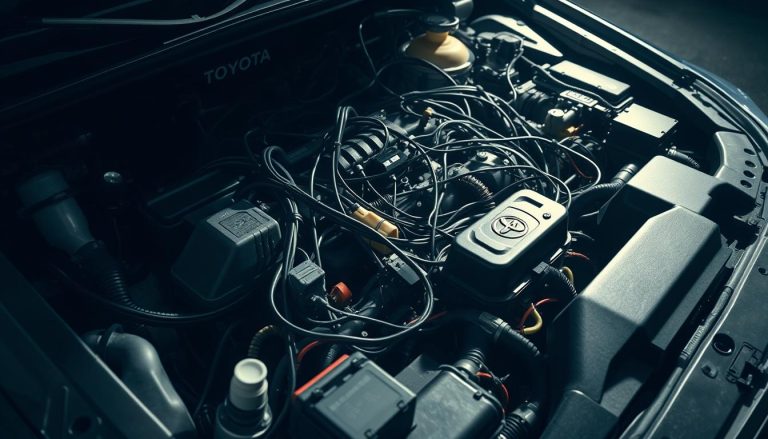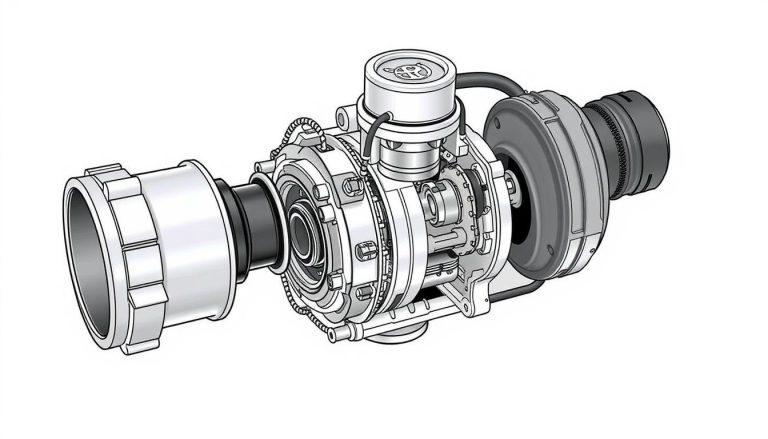Toyota Battery Problems: Causes & Solutions
Toyota cars are known for their long-lasting quality and dependability. Yet, even the best cars can face battery issues. These problems can really affect how well your car works, leaving you stuck or facing expensive fixes. It’s important to know why these issues happen and how to fix them to keep your car in top shape.
Toyota owners often deal with electrical problems, dead batteries, and faulty starters. These common Toyota battery issues need quick action to keep your car running right. This guide will help you spot and solve these problems fast.
Discover the warning signs, how to prevent them, and effective fixes to make your battery last longer. Stay ahead with expert tips that fit your Toyota’s specific needs.
Understanding the Role of a Car Battery
A car battery is key to a Toyota’s performance, providing electrical power. A good battery ensures a reliable start and smooth operation of the car’s systems. This includes the ignition, lights, and infotainment. Fixing Toyota car battery issues quickly can avoid breakdowns and extend your car’s life.
Importance in Vehicle Performance
A car battery does more than just start the engine. It keeps essential systems running smoothly. This means your Toyota will work well in different driving situations. Knowing how to fix Toyota battery problems helps keep your car running well.
Basic Components and Functions
Knowing the parts of a car battery helps you fix problems. The main parts are:
- Cells: These are the building blocks of the battery, responsible for storing and releasing electrical energy.
- Terminals: The positive and negative terminals connect the battery to the vehicle’s electrical system, ensuring energy flow.
- Casing: The outer shell protects internal components from physical damage and environmental elements.
Understanding these parts helps car owners fix common issues and do basic maintenance.
Common Signs of Toyota Battery Problems
Spotting early signs of a failing car battery in your Toyota can avoid big headaches. A slow engine crank or dim headlights are clear warnings. Knowing these signs helps keep your car running smoothly.
Slow Engine Crank
A slow engine crank is a big red flag. When you try to start the car, it takes a while. This usually means the battery isn’t giving enough power. Check your Toyota’s battery maintenance guide for how to test and inspect it.
Dimming Headlights
Dim headlights are another sign of trouble. They need a strong battery to shine well. If your headlights are dim, it might mean your battery is weak. Use a Toyota battery troubleshooting guide to check the voltage and connections.
Frequent Jump-Starts
Need to jump-start your car often? That’s a clear sign of battery issues. It means your battery can’t hold a charge. A detailed Toyota battery maintenance guide can help figure out if you need a new battery or if there’s another problem.
Dead or Weak Battery: Symptoms and Causes
Many Toyota owners face a dead or weak battery, which can hurt the car’s performance. Knowing the signs and causes of a weak battery can stop unexpected breakdowns and expensive fixes. Spotting these signs early and fixing the problems is key to keeping your Toyota’s electrical system healthy.
Signs of a Weak Battery
There are several signs that show a Toyota battery is weak or dying. These include:
- Sluggish engine start or trouble cranking the engine
- Dim or flickering headlights and interior lights
- Frequent need for jump-starts
- Unusual electrical problems, like a broken radio or power windows
Common Causes of Battery Failure
Knowing why Toyota batteries fail helps prevent problems. Here are common reasons for battery issues:
- Extended use beyond the battery’s lifespan
- A faulty charging system, causing the battery not to charge right
- Extreme temperatures, hot or cold, hurting battery efficiency
- Leaving electrical accessories on for too long without the engine running
To better understand battery failure causes, look at this data:
| Cause | Impact | Prevention Tips |
|---|---|---|
| Prolonged Battery Use | Reduced efficiency and eventual failure | Regularly check and replace battery within the recommended timeframe |
| Faulty Charging System | Battery not charging properly, leading to frequent failures | Conduct routine charging system checks and maintenance |
| Extreme Temperatures | Decreased battery performance and lifespan | Park in a garage or shaded area whenever possible |
| Leaving Electrical Accessories On | Battery drain and possible dead battery | Ensure all accessories are turned off when the engine is not running |
How to Fix Toyota Battery Problems
When your Toyota has battery issues, finding the cause is key. Taking detailed steps to diagnose helps figure out if a small fix or a full replacement is needed.
Diagnosing the Issue
To find out what’s wrong with your battery, start by checking its voltage with a multimeter. A good battery should read about 12.6 volts. If it’s lower, it might be weak and need fixing.
Also, look for any damage, corrosion, or loose connections on the battery. These are common problems.
After figuring out the problem, decide if you can fix it or if you need a new battery. For example, if terminals are corroded, cleaning them might solve the issue. But if the voltage keeps dropping, the battery might need to be replaced.
Repair vs. Replacement
After finding the problem, decide if you should repair or replace the battery. Small issues like loose connections or a bit of corrosion can often be fixed easily. This might mean tightening things, cleaning the terminals, or just charging the battery.
But if the battery is really worn out, showing signs of not holding charge or needing jump-starts often, it’s time for a new one. Choosing a good, compatible battery is important for reliability. Regular checks can also catch problems early, avoiding bigger issues later.
The Importance of Regular Battery Maintenance
Keeping your Toyota’s battery in top shape is key for your car’s long-term health. A good Toyota battery maintenance guide can help you dodge unexpected breakdowns. It also helps extend your battery’s life.
Preventative Measures
To keep your Toyota car battery running smoothly, add these steps to your routine. They help a lot:
- Cleaning Terminals: Clean the battery terminals often to stop corrosion. This keeps the electrical flow smooth.
- Ensuring Tight Connections: Always check that the battery connections are tight. This prevents power loss.
- Keeping the Battery Charged: In cold weather, make sure your battery is fully charged. This stops it from freezing and keeps it ready to start.
Maintenance Tips
- Regular Inspections: Get your battery checked by a pro to catch problems early.
- Electrolyte Levels: Check and keep the right electrolyte levels in your battery if needed.
- Battery Charge: Use a battery maintainer or trickle charger when your car is not in use. This keeps the battery healthy.
- Temperature Control: Park your Toyota in a garage or a shaded area. This protects the battery from extreme temperatures.
Sticking to these Toyota battery maintenance guide tips helps your car run better and last longer. It’s not just about fixing problems when they happen. It’s about taking care of your battery before it fails. With these easy steps, you can make sure your car’s battery works its best.
Steps for Toyota Battery Replacement
Replacing your Toyota battery is key to keeping your car running well. Knowing the steps helps you pick the right battery and install it right.
Choosing the Right Battery
Choosing the right battery for your Toyota means looking at size, type, and specs. Make sure they match your car’s needs. Check your Toyota’s manual or talk to a pro to find the correct battery type.
DIY Replacement Guide
If you like DIY, here are some tips for replacing your Toyota battery:
- Make sure the car is off and parked on a flat surface.
- Find the battery, usually under the hood.
- Start by disconnecting the negative terminal, then the positive one.
- Take off any brackets or screws that hold the battery in place.
- Remove the old battery and put the new one in the battery tray.
- Reconnect the positive terminal first, then the negative one.
- Put back any brackets or screws you removed earlier.
- Start the car to test the new battery.
Professional Replacement Services
If you’d prefer a pro to do it, that’s a good choice. Experts make sure the battery is installed right. They also take care of the old battery, following environmental rules.
For a safe and efficient battery replacement, talk to your local Toyota dealer or a certified service center.
Dealing with Malfunctioning Starters
Malfunctioning starters can really hurt a Toyota’s engine performance. Spotting problems early can prevent bigger issues later. Let’s look at how to spot and fix Toyota starter problems.
Identifying a Faulty Starter
Signs of a bad starter include:
- Unusual noises when you try to start the car, like grinding or clicking.
- The car sometimes doesn’t start when you turn the key.
- The engine won’t start even when the battery is full.
Repair Options
Fixing repairing Toyota starters depends on the problem’s severity. Here are the main fixes:
| Repair Option | Description | Cost Estimate |
|---|---|---|
| Solenoid Replacement | Replacing the solenoid, which starts the starter motor. | $50 – $150 |
| Starter Motor Overhaul | Rebuilding the starter motor, fixing worn parts. | $150 – $500 |
| Full Starter Replacement | Swapping the whole starter unit for a new one. | $200 – $1,000 |
Each fix has its benefits and drawbacks. Knowing these options helps you choose wisely when dealing with Toyota starter problems.
Toyota Battery Troubleshooting Techniques
Fixing Toyota electrical problems needs a careful plan. Using diagnostic tools is a key method. These tools check error codes and battery health. They help find if the issue is with the battery, alternator, or other parts.
Using Diagnostic Tools
Diagnostic tools are key for fixing Toyota battery issues. They scan your car’s system for error codes. For example, a multimeter checks the battery’s voltage. An onboard diagnostic (OBD) scanner gives deeper insights.
- Multimeters measure charge levels and voltage.
- OBD scanners decode error messages.
- Battery testers check for physical damage and overall health.
Common Troubleshooting Steps
Here are steps to diagnose and fix Toyota electrical issues:
- Use a multimeter to check the battery’s charge. It should be between 12.4 and 12.7 volts.
- Look for physical damage on the battery, like corrosion or leaks.
- Test the alternator to make sure it’s charging the battery right.
- Check the battery terminals and cables for tightness and cleanliness.
- Use an OBD scanner to find any error codes related to the electrical system.
Fixing Toyota electrical issues quickly can stop bigger problems. It also helps keep your car’s battery and electrical system working well for longer.
Addressing Faulty Alternators
The alternator is key in charging your Toyota’s battery and powering the electrical system. Faulty alternators can harm the battery, causing poor performance and shortening its life. Spotting early signs of failure is vital for your vehicle’s health.
How Alternators Affect the Battery
A bad alternator hurts your Toyota’s battery charging. This can lead to issues like dim headlights and engine stalls. Recognizing these signs early can help fix problems before they get worse.
Replacing a Faulty Alternator
Replacing a bad alternator is often needed when you face issues. Make sure to pick the right alternator for your Toyota. Installing it correctly is important for good battery charging and car performance. If you’re not sure how to do it, getting help from a pro is a good idea.
Solving Wiring Problems
Wiring issues in Toyota vehicles can really affect how well they work and how safe they are. It’s very important to fix these problems quickly to prevent more issues. This guide will show you how to spot and fix Toyota wiring problems the right way.
Identifying Wiring Issues
Toyota wiring problems can show up in many ways. You might see frayed wires, exposed insulation, or smell burnt smells. Also, if electrical parts don’t work right, it could mean there’s a wiring problem.
Professional Wiring Repairs
While some simple electrical fixes might be doable for DIY experts, modern car wiring is often too complex. Professional technicians have the right tools and know-how to find and fix these problems. They make sure your car’s electrical system works right and is safe.
| Service | DIY Approach | Professional Approach |
|---|---|---|
| Identifying Wiring Damage | Visual inspection and basic tests | Advanced diagnostic tools |
| Repairing Damaged Wires | Basic splicing and insulation | Comprehensive wire replacement |
| Ensuring System Integrity | Trial and error testing | Guaranteed repairs with professional oversight |
Understanding Electrical System Failures
Electrical system failures in Toyota vehicles can be tricky. They often come from complex problems. To fix these, you need to know what you’re doing to keep your car safe and reliable.
Common Causes
Many things can cause electrical failures in Toyotas. Bad fuses, faulty control modules, and wiring problems are common. Also, issues with the Toyota battery can make things worse.
Diagnosis and Repair
Figuring out electrical failures needs advanced tools and expert skills. A good repair job finds and fixes the main problem. It’s important to handle both small and big issues to prevent more problems.
Choosing Quality Replacement Parts
It’s important to pick the right parts for your Toyota to keep it running well. The battery is key to your car’s performance. So, choosing a good battery is a must.
Recommended Battery Brands
For top-notch Toyota parts, go for well-known battery brands. Optima, Bosch, and Duralast are great choices. They’re known for being reliable and fitting well with Toyotas.
These brands ensure your car runs smoothly and lasts longer. They’re a smart pick for anyone looking to replace their Toyota battery.
Where to Buy Replacement Parts
Getting genuine Toyota parts is vital for your car’s health. Buy from authorized Toyota dealerships or trusted auto parts stores. This way, you get parts that are true to their quality.
It also means you get warranty coverage. This adds peace of mind and protects your investment.
Impact of Extreme Weather on Toyota Batteries
Extreme weather can really affect how well Toyota batteries work. Both hot and cold weather bring their own set of problems. Knowing how to deal with these issues can help keep your battery in top shape all year.
Heat-Related Battery Issues
Summer heat is tough on Toyota batteries. It makes the battery fluid evaporate faster, reducing its performance. The heat also speeds up the wear and tear of the battery’s parts.
- Loss of Battery Fluid: Heat induces the evaporation of essential fluids.
- Increased Internal Wear: Elevated temperatures speed up the wear and tear process.
Cold Weather Effects on Batteries
Winter can also harm your Toyota battery. Cold weather makes it harder to start your car. The cold slows down the chemical reactions needed to power your car, causing starting problems.
- Reduced Battery Capacity: Cold temperatures diminish the battery’s ability to hold a charge.
- Starting Difficulties: The engine may struggle to start as the cold weather impacts battery efficiency.
Using a Toyota battery maintenance guide for extreme weather can help. Regular checks and using insulated blankets are key steps in caring for Toyota battery all year.
Preventative Care to Extend Battery Life
Keeping your Toyota’s battery in good shape is key for its long life and best performance. Regular care can help your battery last longer and avoid common problems.
Routine Inspections
It’s important to check your battery often for any issues. Look for corrosion, leaks, or damage. Use a multimeter to check the voltage and make sure it’s right.
Spotting and fixing problems early helps keep your battery working well.
Maintaining Clean Battery Terminals
Keeping your battery terminals clean is simple but effective. Corrosion can hurt your battery’s performance and cause starting problems. Clean them with a baking soda and water mix.
Then, apply a thin layer of petroleum jelly to stop corrosion. Clean terminals mean better connection and battery function.
Conclusion
Keeping your Toyota running well means paying attention to its battery. Start by spotting signs like slow engine starts, dim lights, and needing frequent jumps. Knowing these signs and what might cause them helps you act fast.
Regular care is key to avoiding big problems. Simple steps like cleaning battery terminals can make a big difference. Also, knowing when to call a pro for tough issues like alternator problems is important.
By taking care of your Toyota and making smart choices, you keep it running smoothly. This article’s advice helps you tackle battery issues and keep your car in top shape for years.
FAQ
What are common causes of Toyota battery problems?
Toyota battery issues often stem from using the battery too long, faulty charging systems, and extreme temperatures. Spotting these problems early can avoid bigger electrical system issues.
Why is a car battery important for Toyota vehicles?
A car battery is key for Toyota vehicles. It powers the engine start and runs electrical parts. A good battery keeps systems like ignition and electrical systems working well.
What are the signs of a weak or dead Toyota battery?
A weak or dead battery shows as slow engine start, dim lights, and needing jump-starts often. These signs mean the battery can’t hold a charge well, so it needs checking or replacing.
How can I fix battery issues in my Toyota car?
To fix battery issues, first, use tests to check voltage and battery health. Based on the findings, you might need to tighten connections, remove corrosion, or replace the battery.
What are the steps to replace a Toyota battery?
Replacing a Toyota battery means picking the right type for your model and following a DIY guide. Or, you can get a pro to handle it for safe disposal and correct installation.
How can I extend the life of my Toyota battery?
To make your Toyota battery last longer, check it regularly, clean terminals, and keep connections tight. Charge it well, and get professional checks to catch problems early.
What should I do if I suspect my Toyota’s starter is malfunctioning?
If your starter acts up, you might hear odd noises or it doesn’t start right. You could need to replace parts or the whole starter, depending on the problem.
How do I troubleshoot Toyota battery problems?
To troubleshoot, use diagnostic tools to check error codes and battery health. Look at the charge level, check for damage, and test the alternator. These steps help find and fix the issue.
How can a faulty alternator affect my Toyota’s battery?
A bad alternator can’t charge the battery well, shortening its life and affecting your car’s performance. Replacing it with the right model and installing it correctly can fix this.
What are the impacts of extreme weather on Toyota batteries?
Heat can dry out the battery and wear it down, while cold can reduce its power and make starting hard. Regular checks and insulated blankets can protect it from these effects.

